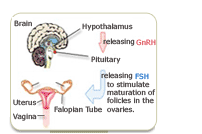34 MENOPAUSE SYMPTOMS |
HEALTH CENTER |
|
| |
|
|
|
|
About Menopause Sleep Disorders |
|
|
|
|
|
Sleep disorders are a potentially debilitating problem. A persistent lack of adequate sleep can disrupt normal daytime activity and trigger a host of other problems in turn. Sleep disorders generally worsen in middle-aged women going through menopause, even if they were not a problem before. Fortunately, menopausal sleep disorders are a treatable issue. Keep reading to learn about the types and symptoms of menopausal sleep disorders in order to make an informed decision about treatment.
|
|
|
Menopausal women suffering from sleep disorders often find it impossible to sleep through the night. The most common sleep disorders include: insomnia, sleep apnea, hot flashes/night sweats that disrupt sleep, and restless leg syndrome (RLS).
|
Symptoms of menopausal sleep disorders can appear as early as 5 to 7 years before menopause actually occurs, making this a potentially long-lasting and debilitating problem.
|
|
- Insomnia: Inability to fall asleep and/or waking up frequently on a regular basis.
- Sleep apnea: Cessation of breathing during sleep (often accompanied by snoring).
- Night sweats: Nocturnal hot flashes (sudden sensation of intense heat, perspiration, flushing) that disrupt sleep
- Restless Leg Syndrome (RLS): Irresistible urge to move the legs during rest, often experienced as an itching or spasmodic sensation. This is a neurological condition that is rarer than the other symptoms.
|
|
Lack of adequate sleep causes daytime fatigue, difficulty concentrating, headaches, and can weaken the immune system, leaving the body more vulnerable to infection and illness.
Until recently, research has focused on sleep disorders as a typically male issue. It has become evident, however, that sleep disorders are also a serious problem for women going through menopause, due to factors related to aging and hormonal fluctuations. Keep reading to learn about the causes of menopausal sleep disorders.  |
|
| |
|

|
|
Sleep apnea leading cause of sleep problems |
|
Sleep apnea is a leading cause of disrupted sleep in women. Although it has been considered a typically male disorder, researchers found that sleep apnea frequently appears in menopausal women due to hormonal causes. |
|
|
| |
| |
| |
|
|
|
Sleep disorders may seem relentless, but there are different treatment options that can relieve the problem. Keep reading the section below to learn about the most effective treatments for menopause related sleep disorders, including lifestyle changes, alternative treatments, and medical procedures.
|
|
|
|
|
Treatment for Sleep Disorders
with MacaActive Supplements |
|
As you have already read, sleep disorders are mainly caused by declining estrogen levels, which is a natural part of aging. Therefore, if you want relief from this undesirable symptom, you must restore estrogen hormone levels.
Today there are three effective ways to normalize hormonal levels: lifestyle changes, alternative medicine and drugs & surgery.
|
|
 |
Lifestyle Changes: This level of treatment involves no risk, but may be the hardest way to go because you'll have to restrict yourself from many things. That's why most people consider the next level of treatment, alternative medicine, which has proven to be excellent for treating sleep disorders in a safe and natural way.
|
|
 |
Alternative medicine: There are two types of herbal supplements for treating sleep disorders: Those containing phytoestrogenic herbs, and those containing non-estrogenic herbs. Phytoestrogenic herbs (like Black Cohosh) are filled with phytoestrogens, which are similar to estrogens. They can increase low estrogen levels by replacing some of the missing estrogen hormones. This isn't the best solution, however, because your body will become less responsive to producing estrogen on its own, causing a further decrease in body-own hormone levels. Unlike phytoestrogenic herbs, non-estrogenic herbs don't contain estrogen, but nourish hormonal glands to work more efficiently. This ultimately results in balancing not only estrogen, but other necessary hormones, as well. Non-estrogenic herbs are thus one of the best and safest ways to treat sleep disorders naturally.
An excellent example of a safe and effective non-estrogenic herb for hormonal imbalance is herbal MacaActive. What makes MacaActive so special is its ability to balance hormonal levels in women by nourishing the hormonal glands. It thus alleviates most disorders related to hormonal imbalance, including sleep disorders.  to read more about MacaActive.
|
|
 |
Drugs and Surgery: This level of treatment has the highest risk and often the highest costs. The most common drug therapy for treating sleep disorders in the US is hormone replacement therapy (HRT). There's no doubt that this is the quickest and strongest way to combat hormonal imbalance. Unfortunately, it entails serious side effects and increases the risk of different types of cancer in women. If you still want to consider this approach, see your doctor to become better informed about what this treatment option involves.
|
|
A safe way to balance hormones:
Non-estrogenic herbs are the most effective solution for treating hormonal imbalance and its related symptom, sleep disorders.
MacaActive is an excellent non-estrogenic herb. It's simple: rather than putting hormones from the outside into your body artificially, MacaActive stimulates your hormone glands into producing the necessary hormones naturally. This is what makes MacaActive supplements so unique.  to read all about MacaActive. |
 |
|
 |
|
|
|







